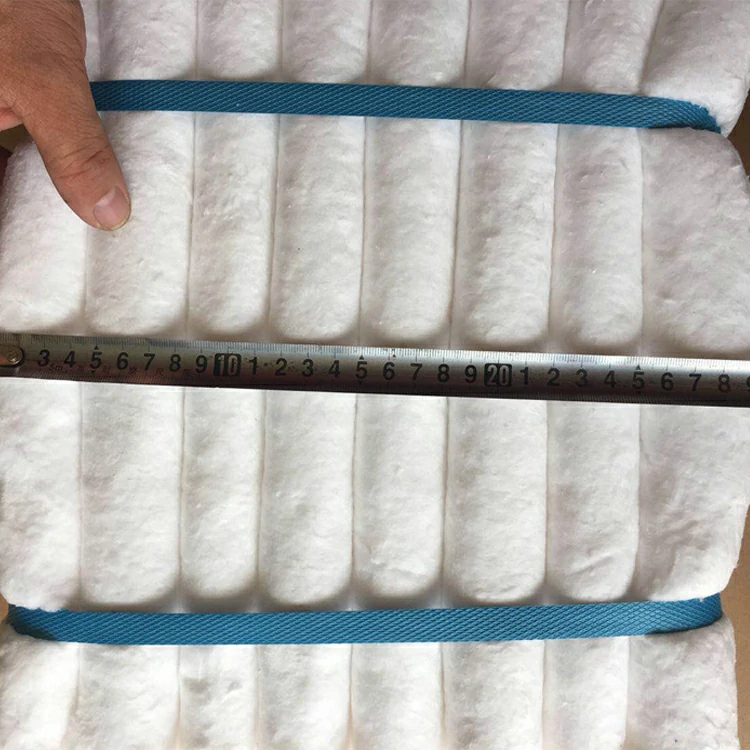In high-temperature industrial processes, the need for reliable and efficient insulation solutions is paramount. One such solution is the 1260C ceramic fiber module, a versatile and high-performance material that offers exceptional thermal insulation properties. This article explores the features, applications, and benefits of 1260C ceramic fiber modules in enhancing high-temperature industrial processes.
Understanding 1260C Ceramic Fiber Modules
Overview of Ceramic Fiber Modules
Ceramic fiber modules are prefabricated insulation units composed of high-temperature resistant ceramic fibers. These modules are designed to provide excellent thermal insulation, energy conservation, and heat containment in various industrial applications.
Features and Properties of 1260C Ceramic Fiber Modules
The 1260C ceramic fiber modules are specifically engineered to withstand temperatures up to 1260 degrees Celsius. They possess low thermal conductivity, high thermal stability, excellent resistance to thermal shock, and low heat storage capacity. These properties make them ideal for applications requiring insulation in extreme heat environments.
Applications of 1260C Ceramic Fiber Modules
Furnace and Kiln Linings
1260C ceramic fiber modules are widely used in the lining of furnaces and kilns in industries such as steel, glass, ceramics, and cement. They provide effective insulation, reducing heat loss and improving energy efficiency in these high-temperature environments.
Heat Treatment Equipment
In heat treatment processes, such as annealing, tempering, and quenching, maintaining precise and uniform temperatures is crucial. 1260C ceramic fiber modules offer excellent insulation, ensuring consistent heat distribution and minimizing heat loss in heat treatment equipment.
Petrochemical Industry
The petrochemical industry often operates at high temperatures, and insulation is critical to prevent energy loss and maintain process efficiency. 1260C ceramic fiber modules find applications in equipment such as reformers, heaters, and cracking furnaces, providing reliable thermal insulation and reducing heat transfer.
Power Generation
In power plants, where high temperatures are generated during combustion processes, 1260C ceramic fiber modules are used to insulate boilers, furnaces, and ductwork. They help to improve energy efficiency, reduce heat loss, and enhance overall plant performance.
Benefits of 1260C Ceramic Fiber Modules
Thermal Insulation Efficiency
The exceptional thermal insulation properties of 1260C ceramic fiber modules contribute to reduced heat loss, improved energy efficiency, and cost savings in industrial processes. They help maintain stable and uniform temperatures, ensuring optimal performance and product quality.
Lightweight and Easy Installation
1260C ceramic fiber modules are lightweight and easy to handle, making installation and maintenance convenient. Their modular design allows for quick and efficient installation, minimizing downtime during insulation repairs or upgrades.
Resistance to Thermal Shock
The ability of 1260C ceramic fiber modules to withstand thermal shock ensures their durability and longevity in high-temperature environments. They can withstand rapid temperature changes without cracking or degrading, providing long-term insulation solutions.
Low Heat Storage Capacity
The low heat storage capacity of 1260C ceramic fiber modules allows for rapid heating and cooling cycles, reducing energy consumption and improving process efficiency. This feature is particularly beneficial in applications that require frequent temperature changes.
Safety Considerations and Environmental Impact
Safety Measures
While 1260C ceramic fiber modules offer excellent thermal insulation, it is essential to follow safety guidelines during installation and maintenance. Protective equipment, such as gloves and masks, should be used to minimize exposure to ceramic fibers.
Environmental Impact
Ceramic fiber modules are considered environmentally friendly due to their low thermal conductivity, which reduces energy consumption. However, proper disposal methods should be followed to prevent any potential environmental impact.
Future Developments and Innovations
The field of ceramic fiber insulation is continuously evolving, driven by the need for improved performance and sustainability. Future developments may include advancements in material composition, increased temperature resistance, and enhanced installation techniques to further optimize the efficiency and durability of 1260C ceramic fiber modules.
1260C ceramic fiber modules offer a reliable and efficient solution for thermal insulation in high-temperature industrial processes. Their exceptional thermal properties,1260C ceramic fiber modules ease of installation, and wide range of applications make them indispensable in industries such as steel, glass, petrochemicals, and power generation. As technology advances, these modules are likely to play an increasingly vital role in enhancing energy efficiency and process optimization in high-temperature environments.
